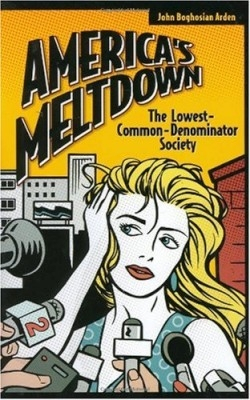America's Meltdown
The Lowest-Common-Denominator Society
During the 2000 presidential campaign, George W. Bush accused Al Gore of being “a thinker.” His reproach of the wonkish Vice President seemed to score points with the electorate. Why? Isn’t thinking a quality Americans would demand, expect, and admire in a presidential candidate? Apparently not. According to the author, the reason for this is that American society is melting down to the lowest common denominator.
Everywhere he looks, Arden, who is director of training in the Department of Psychiatry at the Kaiser Permanente Medical Center, sees signs that our society is becoming a simplistic orgy of entertainment, consumerism, and intellectual atrophy. He has compiled an important and worrisome, if not original, analysis of the meltdown.
Arden rounds up the usual suspects: corporate America, the mass media, a malleable public. He describes a dramatic synergy between mass media and corporate domination of the economy, where the goal is to sell products to the largest number of customers. The result is gratuitous violence, base humor, simple plots. Any attempt to attract customers by using thought-provoking motifs inevitably falls short.
Not surprisingly, Arden places much of the blame on the vicarious world of television, where, he observes, Americans spend way too much time. Once out in the real world, they then conform to television’s values, language, and aesthetics, dressing and talking as if they were in a commercial.
Arden says an excellent illustration of the change in American consciousness can be found in what we find newsworthy. It goes beyond the celebrity scandals and violent crimes that lead the nightly news. More subtle and insidious is the expectation that viewers need not form opinions of their own. Instead, as pundits spar entertainingly, opinions are chosen around clichés and posturing rather than reasoning.
The emergence of Ronald Reagan and George W. Bush as political leaders illustrates how vulnerable we have become to media production rather than frank discussion of diverse perspectives. Twenty years before Bush accused Gore of being a thinker, Reagan shook his head at Jimmy Carter’s careful analysis of an issue and said, “Well there you go again.” The post-debate commentary concluded that Reagan had looked good and had won.
None of Arden’s observations is new, but he presents them coherently and convincingly, and thoughtful readers will find little to disagree with. Arden concludes with pessimism about the reversibility of the meltdown and offers some rather tame solutions: watch less television, consider every purchase. Of course, the choir to whom Arden preaches already practices those behaviors religiously.
Reviewed by
Rob Mitchell
Disclosure: This article is not an endorsement, but a review. The publisher of this book provided free copies of the book to have their book reviewed by a professional reviewer. No fee was paid by the publisher for this review. Foreword Reviews only recommends books that we love. Foreword Magazine, Inc. is disclosing this in accordance with the Federal Trade Commission’s 16 CFR, Part 255.

